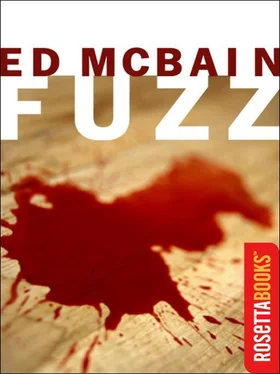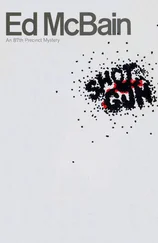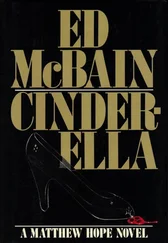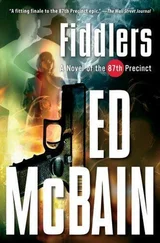Ed Mcbain - Fuzz
Здесь есть возможность читать онлайн «Ed Mcbain - Fuzz» весь текст электронной книги совершенно бесплатно (целиком полную версию без сокращений). В некоторых случаях можно слушать аудио, скачать через торрент в формате fb2 и присутствует краткое содержание. Жанр: Полицейский детектив, на английском языке. Описание произведения, (предисловие) а так же отзывы посетителей доступны на портале библиотеки ЛибКат.
- Название:Fuzz
- Автор:
- Жанр:
- Год:неизвестен
- ISBN:нет данных
- Рейтинг книги:3 / 5. Голосов: 1
-
Избранное:Добавить в избранное
- Отзывы:
-
Ваша оценка:
- 60
- 1
- 2
- 3
- 4
- 5
Fuzz: краткое содержание, описание и аннотация
Предлагаем к чтению аннотацию, описание, краткое содержание или предисловие (зависит от того, что написал сам автор книги «Fuzz»). Если вы не нашли необходимую информацию о книге — напишите в комментариях, мы постараемся отыскать её.
Fuzz — читать онлайн бесплатно полную книгу (весь текст) целиком
Ниже представлен текст книги, разбитый по страницам. Система сохранения места последней прочитанной страницы, позволяет с удобством читать онлайн бесплатно книгу «Fuzz», без необходимости каждый раз заново искать на чём Вы остановились. Поставьте закладку, и сможете в любой момент перейти на страницу, на которой закончили чтение.
Интервал:
Закладка:
“Well, he didn’t say lunch pail at first. He just said lunch. “
“When did he say lunch pail? “
“After he gave me the five bucks.”
“Oh, he offered you five dollars to go get his lunch pail, is that it?”
“He didn’t offer it to me, he handed it to me.”
“He handed you five bucks and said, ‘Would you go get my lunch pail for me?’ “
“That’s right. And he told me it would be on the third bench in the park, on the Clinton Street footpath. Which is right where it was.”
“What were you supposed to do with this lunch pail after you got it?”
“Bring it back to him. He was holding my place in line.”
“Mm-huh,” Brown said.
“What’s so important about that lunch pail, anyway?” La Bresca asked.
“Nothing, Willis said. “Tell us about this man. What did he look like?”
“Ordinary-looking guy.”
“How old would you say he was?”
“Middle thirties, thirty-five, something like that.”
“Tall, short, or average?”
“Tall. About six feet, I would say, give or take.”
“What about his build? Heavy, medium, or slight?”
“He was built nice. Good shoulders.”
“Heavy?”
“Husky, I would say. A good build.”
“What color was his hair?”
“Blond.”
“Was he wearing a mustache or a beard?”
“No.”
“What color were his eyes, did you notice?”
“Blue.”
“Did you notice any scars or identifying marks?”
“No.”
“Tattoos?”
“No.”
“What sort of voice did he have?”
“Average voice. Not too deep. Just average. A good voice.”
“Any accent or regional dialect?”
“No.”
“What was he wearing?”
“Brown overcoat, brown gloves.”
“Suit?”
“I couldn’t see what he had on under the coat. I mean, he was wearing pants, naturally, but I didn’t notice what color they were, and I couldn’t tell you whether they were part of a suit or whether …”
“Fine, was he wearing a hat?”
“No hat.”
“Glasses?”
“No glasses.”
“Anything else you might have noticed about him?”
“Yeah,” La Bresca said.
“What?”
“He was wearing a hearing aid.”
The employment agency was on the corner of Ainsley Avenue and Clinton Street, five blocks north of the entrance to the park’s Clinton Street footpath. On the off-chance that the man wearing the hearing aid would still be waiting for La Bresca’s return, they checked out a sedan and drove over from the station house. La Bresca sat in the back of the car, willing and eager to identify the man if he was still there.
There was a line of men stretching halfway around the corner of Clinton, burly men in work clothes and caps, hands thrust into coat pockets, faces white with cold, feet moving incessantly as they shuffled and jigged and tried to keep warm.
“You’d think they were giving away dollar bills up there,” La Bresca said. “Actually, they charge you a whole week’s pay. They got good jobs, though. The last one they got me paid real good, and it lasted eight months.”
“Do you see your man anywhere on that line?” Brown asked.
“I can’t tell from here. Can we get out?”
“Yeah, sure,” Brown said.
They parked the car at the curb. Willis, who had been driving, got out first. He was small and light, with the easy grace of a dancer and the steady cold gaze of a blackjack dealer. He kept slapping his gloved hands together as he waited for Brown. Brown came out of the car like a rhinoceros, pushing his huge body through the door frame, slamming the door behind him, and then pulling his gloves on over big-knuckled hands.
“Did you throw the visor?” Willis asked.
“No. We’ll only be a minute here.”
“You’d better throw it. Goddamn eager beavers’ll give us a ticket sure as hell.”
Brown grunted and went back into the car.
“Boy, it’s cold out here,” La Bresca said.
“Yeah,” Willis said.
In the car, Brown lowered the sun visor. A hand-lettered cardboard sign was fastened to the visor with rubber bands. It read:
POLICE DEPARTMENT VEHICLE
The car door slammed again. Brown came over and nodded, and together, they began walking toward the line of men standing on the sidewalk. Both detectives unbuttoned their overcoats.
“Do you see him?” Brown asked La Bresca.
“Not yet,” La Bresca said.
They walked the length of the line slowly.
“Well?” Brown asked.
“No,” La Bresca said. “He ain’t here.”
“Let’s take a look upstairs,” Willis suggested.
The line of job seekers continued up a flight of rickety wooden steps to a dingy second-floor office. The lettering on a frosted glass door read:
MERIDIAN EMPLOYMENT AGENCY
JOBS OUR SPECIALTY
“See him?” Willis asked.
“No,” La Bresca said.
“Wait here,” Willis said, and the two detectives moved away from him, toward the other end of the corridor.
“What do you think?” Brown asked.
“What can we hold him on?”
“Nothing.”
“So that’s what I think.”
“Is he worth a tail?”
“It depends on how serious the loot thinks this is.”
“Why don’t you ask him?”
“I think I will. Hold the fort.”
Brown went back to La Bresca. Willis found a pay phone around the bend in the corridor, and dialed the squadroom. The lieutenant listened carefully to everything he had to report, and then said, “How do you read him?”
“I think he’s telling the truth.”
“You think there really was some guy with a hearing aid?”
“Yes.”
“Then why’d he leave before La Bresca got back with the pail?”
“I don’t know, Pete. I just don’t make La Bresca for a thief.”
“Where’d you say he lived?”
“1812 Johnson. In Riverhead.”
“What precinct would that be?”
“I don’t know.”
“I’ll check it out and give them a ring. Maybe they can spare a man for a tail. Christ knows we can’t.”
“So shall we turn La Bresca loose?”
“Yeah, come on back here. Give him a little scare first, though, just in case.”
“Right,” Willis said, and hung up, and went back to where La Bresca and Brown were waiting.
“Okay, Anthony,” Willis said, “you can go.”
“Go? Who’s going anyplace? I got to get back on that line again. I’m trying to get a job here.”
“And remember, Anthony, if anything happens, we know where to find you.”
“What do you mean? What’s gonna happen?”
“Just remember.”
“Sure,” La Bresca said. He paused and then said, “Listen, you want to do me a favor?”
“What’s that?”
“Get me up to the front of the line there.”
“How can we do that?”
“Well, you’re cops, ain’t you?” La Bresca asked, and Willis and Brown looked at each other.
When they got back to the squadroom, they learned that Lieutenant Byrnes had called the 115th in Riverhead and had been informed they could not spare a man for the surveillance of Anthony La Bresca. Nobody seemed terribly surprised.
That night, as Parks Commissioner Cowper came down the broad white marble steps outside Philharmonic Hall, his wife clinging to his left arm, swathed in mink and wearing a diaphanous white scarf on her head, the commissioner himself resplendent in black tie and dinner jacket, the mayor and his wife four steps ahead, the sky virtually starless, a bitter brittle dryness to the air, that night as the parks commissioner came down the steps of Philharmonic Hall with the huge two-story-high windows behind him casting warm yellow light onto the windswept steps and pavement, that night as the commissioner lifted his left foot preparatory to placing it on the step below, laughing at something his wife said in his ear, his laughter billowing out of his mouth in puffs of visible vapor that whipped away on the wind like comic strip balloons, that night as he tugged on his right-hand glove with his already gloved left hand, that night two shots cracked into the plaza, shattering the wintry stillness, and the commissioner’s laugh stopped, the commissioner’s hand stopped, the commissioner’s foot stopped, and he tumbled headlong down the steps, blood pouring from his forehead and his cheek, and his wife screamed, and the mayor turned to see what was the matter, and an enterprising photographer on the sidewalk caught the toppling commissioner on film for posterity.
Читать дальшеИнтервал:
Закладка:
Похожие книги на «Fuzz»
Представляем Вашему вниманию похожие книги на «Fuzz» списком для выбора. Мы отобрали схожую по названию и смыслу литературу в надежде предоставить читателям больше вариантов отыскать новые, интересные, ещё непрочитанные произведения.
Обсуждение, отзывы о книге «Fuzz» и просто собственные мнения читателей. Оставьте ваши комментарии, напишите, что Вы думаете о произведении, его смысле или главных героях. Укажите что конкретно понравилось, а что нет, и почему Вы так считаете.












